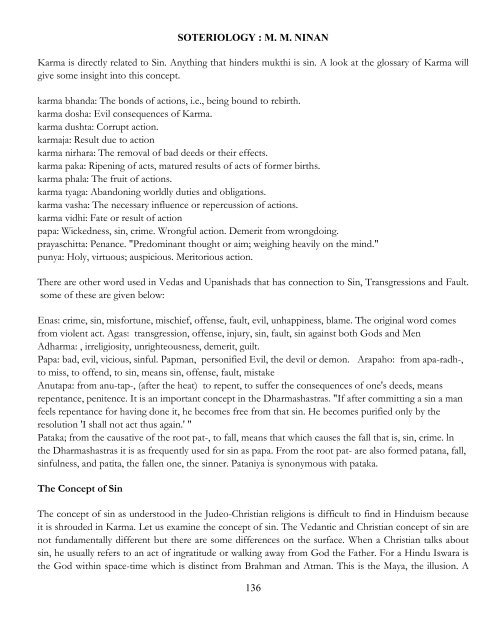Theodicy Soteriology, Hermeneutics
You also want an ePaper? Increase the reach of your titles
YUMPU automatically turns print PDFs into web optimized ePapers that Google loves.
SOTERIOLOGY : M. M. NINAN<br />
Karma is directly related to Sin. Anything that hinders mukthi is sin. A look at the glossary of Karma will<br />
give some insight into this concept.<br />
karma bhanda: The bonds of actions, i.e., being bound to rebirth.<br />
karma dosha: Evil consequences of Karma.<br />
karma dushta: Corrupt action.<br />
karmaja: Result due to action<br />
karma nirhara: The removal of bad deeds or their effects.<br />
karma paka: Ripening of acts, matured results of acts of former births.<br />
karma phala: The fruit of actions.<br />
karma tyaga: Abandoning worldly duties and obligations.<br />
karma vasha: The necessary influence or repercussion of actions.<br />
karma vidhi: Fate or result of action<br />
papa: Wickedness, sin, crime. Wrongful action. Demerit from wrongdoing.<br />
prayaschitta: Penance. "Predominant thought or aim; weighing heavily on the mind."<br />
punya: Holy, virtuous; auspicious. Meritorious action.<br />
There are other word used in Vedas and Upanishads that has connection to Sin, Transgressions and Fault.<br />
some of these are given below:<br />
Enas: crime, sin, misfortune, mischief, offense, fault, evil, unhappiness, blame. The original word comes<br />
from violent act. Agas: transgression, offense, injury, sin, fault, sin against both Gods and Men<br />
Adharma: , irreligiosity, unrighteousness, demerit, guilt.<br />
Papa: bad, evil, vicious, sinful. Papman, personified Evil, the devil or demon. Arapaho: from apa-radh-,<br />
to miss, to offend, to sin, means sin, offense, fault, mistake<br />
Anutapa: from anu-tap-, (after the heat) to repent, to suffer the consequences of one's deeds, means<br />
repentance, penitence. It is an important concept in the Dharmashastras. "If after committing a sin a man<br />
feels repentance for having done it, he becomes free from that sin. He becomes purified only by the<br />
resolution 'I shall not act thus again.' "<br />
Pataka; from the causative of the root pat-, to fall, means that which causes the fall that is, sin, crime. ln<br />
the Dharmashastras it is as frequently used for sin as papa. From the root pat- are also formed patana, fall,<br />
sinfulness, and patita, the fallen one, the sinner. Pataniya is synonymous with pataka.<br />
The Concept of Sin<br />
The concept of sin as understood in the Judeo-Christian religions is difficult to find in Hinduism because<br />
it is shrouded in Karma. Let us examine the concept of sin. The Vedantic and Christian concept of sin are<br />
not fundamentally different but there are some differences on the surface. When a Christian talks about<br />
sin, he usually refers to an act of ingratitude or walking away from God the Father. For a Hindu Iswara is<br />
the God within space-time which is distinct from Brahman and Atman. This is the Maya, the illusion. A<br />
136


















